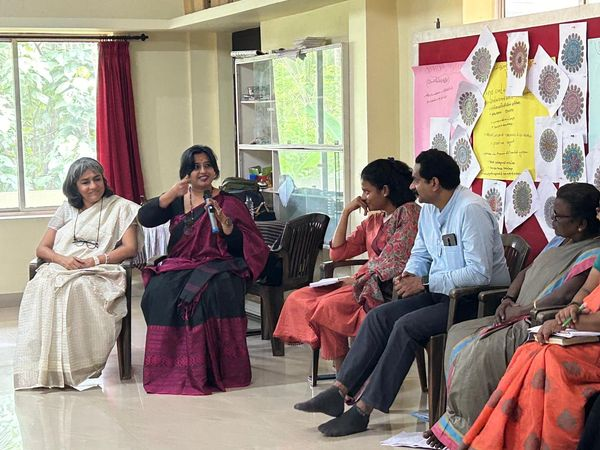September Musings Day21
September 21, 2024

The first real insights into mental health, homelessness, poverty, and how all of these intersect—especially for women—came in the late '90s and early 2000s during the time spent working with The Banyan. Living alongside the women being rehabilitated was a huge eye-opener. It became clear that "rehabilitation" means something different to everyone. It wasn’t just about helping them fit back into society but about understanding what they wanted and needed to move forward. This was a big lesson in unlearning what was previously known, to make space for new ways of thinking.
Fast forward to now, and another opportunity came up to work with The Banyan team again. This time, with the added responsibility of translating Tamil to Malayalam for health workers. It also meant reconnecting with Tamil, which was great! The activities included some role plays that highlighted what can go right in a counseling session, and what can go wrong. It was interesting to see how uncomfortable everyone felt when enacting the "not okay" session—even though it was pretend, the discomfort was very real. It really showed just how important this work is. Learning never stops, that’s for sure.
One of the biggest takeaways during the basic counseling skills training was noticing the instinct to jump in and offer quick solutions. Most people come in looking for a fix—they’re tired, frustrated, and just want someone to rescue them. But the role of a counselor isn’t to hand out quick fixes or make decisions for them. It’s about understanding where their self-doubt comes from. Is it something physical? Are they weighed down by external pressures? Or maybe they’re struggling to manage their life as it is?
The people who come in feeling lost or stuck were once kids who trusted themselves completely. Somewhere along the way, that trust was chipped away. The goal is to help them rebuild it. Offering solutions may seem helpful in the moment, but it can reinforce the idea that someone else is in control of their life—and that’s not the point.
The focus is on giving them space to reconnect—with their bodies, their sensations, their emotions, and eventually, their thoughts. It’s not always about getting to a specific result; sometimes, the healing happens in the process.
Let’s also not forget the importance of truly listening—not to correct, control, or criticize, but to just be present. Many people avoid seeking help because they think, “How could someone else know more about my life than I do?” And in some ways, they’re right! Counseling isn’t about knowing everything or offering solutions. It’s about guiding someone to reconnect with themselves, so they can figure out where and why they feel stuck.
At the end of the day, it’s not about fixing people—it’s about helping them find the strength they’ve always had within.
